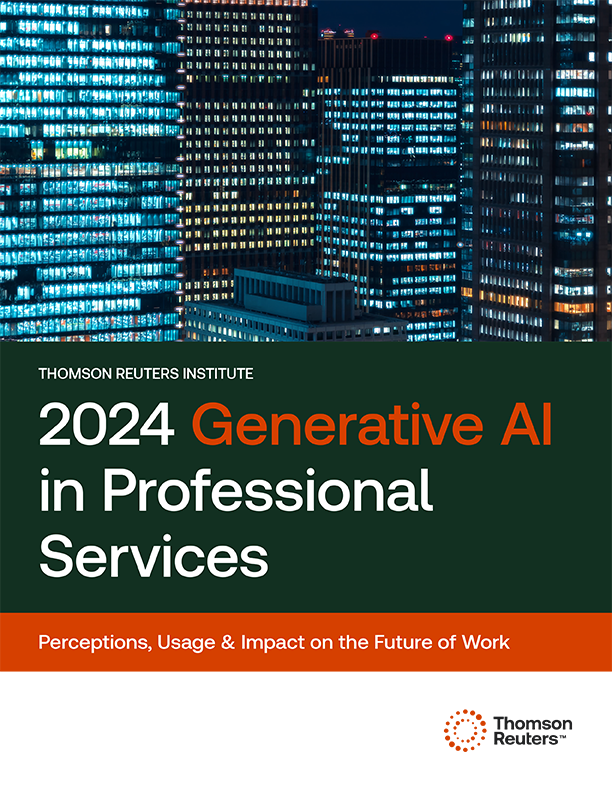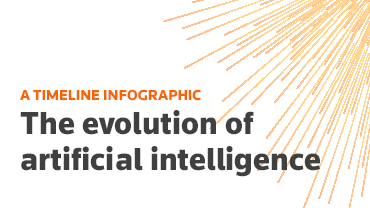GenAI is ushering in a new era of increased productivity, efficiency, and data-driven insight for tax and accounting professionals.
Jump to:
| The rise of GenAI in professional services |
| GenAI’s potential in tax and accounting |
| GenAI insights: Accuracy and data security are top concerns |
| GenAI’s impact on business models and pricing strategies |
| Training for the future: Preparing staff for GenAI |
| GenAI and the road ahead |
For professionals across all industries, the advent of Generative AI (GenAI) has emerged as a transformative force, shifting the landscape and bringing with it both disruption and opportunity.
While adoption isn’t yet fully widespread, more than half of the professionals surveyed in the 2024 Generative AI in Professional Services Report believe that they should use GenAI in their daily work — and they’re already planning for the specialized tools that will create this reality.
When it comes to the tax and accounting profession, GenAI is ushering in a new era of increased productivity, efficiency, and data-driven insight. As such, many forward-looking firms are already adopting solutions to help them take advantage of this enormous opportunity.
If you’re an accountant eager to embrace GenAI as a competitive advantage, it’s important to understand the benefits, the risks, and the undeniable impact it will have on the future of work. Let’s take a look.
The rise of GenAI in professional services
Generative AI is a type of artificial intelligence that creates original content, resembling human-like abilities. Unlike conventional AI, which relies on pre-set responses or learned patterns, generative AI independently generates new outputs.
For accounting firms, GenAI offers the ability to streamline processes, boost efficiency, and derive meaningful insight from client data. When it comes to tax research, it also opens the door to instant access to guidance on tax law and related analysis, revolutionizing the way accountants approach their work.
However, as the old adage goes, with this great power comes great responsibility.
GenAI’s potential in tax and accounting
For accountants, the advantages of GenAI are undeniable. Consider these benefits:
- Data entry automation. Generative AI systems can automate data entry tasks by extracting information from various documents, such as invoices and receipts. This can reduce the manual effort required for data input while minimizing errors.
- Tax research and compliance. Generative AI can assist in keeping track of evolving regulatory requirements and ensuring that financial practices comply with the latest standards. This helps in reducing the risk of non-compliance.
- Document generation and summarization. Generative AI models have the potential to automatically generate financial reports, invoices, or other accounting documents. They could also assist in summarizing lengthy financial statements or reports for quick insights.
- Fraud detection. AI, including generative models, can be used to identify patterns and anomalies in financial data that may indicate fraudulent activities. By analyzing large datasets, AI systems can help auditors and accountants detect irregularities.
- Forecasting and predictive analytics. Generative AI models can be applied for predictive analysis by analyzing historical financial data. This can help accountants forecast future trends and make more informed decisions.
- Natural Language Processing (NLP) for client communication. NLP, a subset of AI, can be integrated into communication tools to enhance interactions with clients, create automated responses to common queries, or even assist in drafting emails and reports.
These examples only scratch the surface of the capabilities of GenAI. With so much potential, it’s easy to see why forward-looking firms have a sense of cautious optimism and are increasingly interested in integrating GenAI into their daily workflow.
GenAI insights: Accuracy and data security are top concerns
According to insights from the GenAI Report, more than half of respondents identified worries such as inaccurate responses (70%); data security (68%); privacy and confidentiality of data (62%); complying with laws and regulations (60%); and ethical and responsible usage (57%) as primary concerns for adopting GenAI.
While a large portion of respondents (44%) said they were hopeful or excited about GenAI, more than one-third of respondents (35%) said they were hesitant, and 18% said they were concerned or fearful. Of the portion that said they were hesitant, 20% said they felt that way due to accuracy concerns, 18% said they were skeptical GenAI can deliver promised results, and 16% were concerned about over-reliance.
This reluctance is warranted because GenAI is trained on large amounts of data from across the internet, however, we don’t know if that data is confidential, proprietary, or quite frankly, accurate. Because tax professionals rely on accuracy and preciseness, there is concern when using publicly available GenAI models (i.e., ChatGPT) for professional purposes as there is no way of knowing what pieces of data the model based its responses on—and no way to validate them.
To address these concerns, proactive accountants opt for AI-driven tax research solutions grounded in data from trusted experts and reliable sources, steering clear of public options that draw information from the vast expanse of the internet.
GenAI’s impact on business models and pricing strategies
Among tax professionals whose firms have already adopted GenAI, there is a split between those who believe GenAI will enable them to increase their pricing rates (40%) and those who think their rates will stay the same (42%).
For some perspective, AI-powered tax technology significantly enhances productivity and efficiency while enabling data-driven insight, opening the door to more strategic tax planning and higher value tasks like predictive analytics. This can result in a new and more profitable value proposition for accounting firms: client advisory services.
If your firm has not yet transitioned to offering advisory services (and implemented a value-based pricing model accordingly), it’s time to re-examine your pricing strategy and ensure you’re properly compensated for the added value your firm provides clients.
Many forward-looking accounting firms are implementing value-based and fixed-fee pricing structures that revolve around delivering meaningful insights to clients and helping them achieve their financial goals year-round—as opposed to once-a-year tax preparation.
Training for the future: Preparing staff for GenAI
Even amidst all of the hype, training staff on generative AI seems not to be a priority. Respondents from corporate risk departments (38%) and corporate legal departments (25%) reported the highest proportion of GenAI training for staff, while less than 20% of law firm and tax firm respondents said they had received GenAI training.
Therein lies an opportunity. Moving fast to harness the power of GenAI and equipping your staff with the training they need to take full advantage of this transformative technology can become a strategic advantage.
In addition to proper training, adopting the right AI platform, supported by a dedicated team, can ensure your firm the precision, efficiency, and data-driven insight to wow clients and boost profitability.
The bottom line? The time is now to seize this groundbreaking technology’s competitive edge.
GenAI and the road ahead
As the tax and accounting profession increasingly adopts GenAI, accountants must navigate a landscape filled with both opportunities and challenges.
To make sure your firm stays ahead of the curve, download the 2024 Generative AI in Professional Services Report
Special Report2024 Generative AI in Professional Services
|
Product PageCheckpoint Edge with CoCounsel
|












